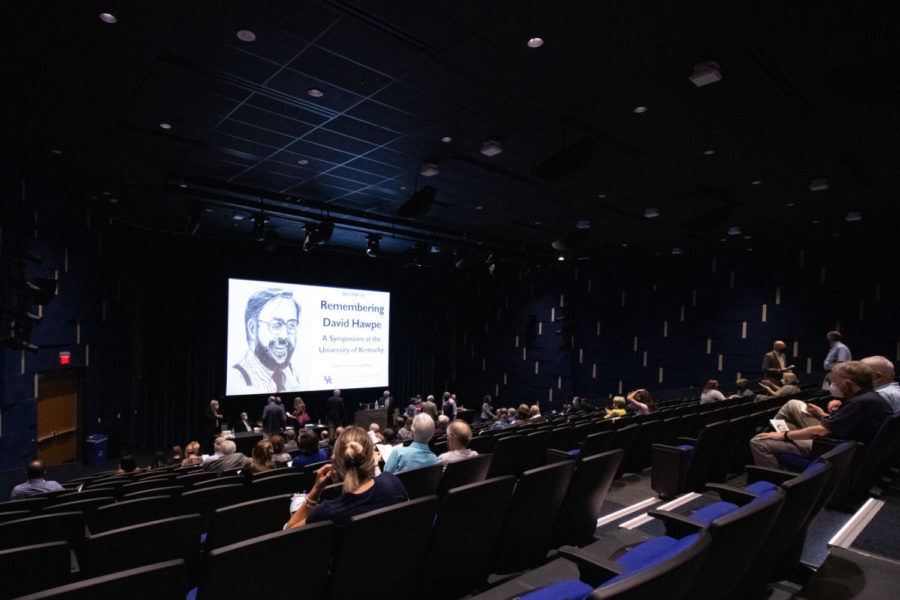‘He sincerely cultivated relationships.’ Friends, co-workers honor life of Kentucky journalist
People gather during a symposium in remembrance of David Hawpe on Friday, Sept. 17, 2021, at Worsham Cinema in Lexington, Kentucky. Photo by Amanda Braman | Staff
September 23, 2021
Over 50 colleagues and friends celebrated the journalistic legacy of late Kentucky native and UK alumnus David Hawpe at a symposium held on Sept. 17.
Hawpe passed away on July 18, 2021. Al Cross, a professor in UK’s School of Journalism and the organizer of the symposium, said the event was organized so that others could honor him properly, as Hawpe did not have a public funeral.
“This is the best chance that David’s friends and colleagues have to pay tribute to him,” Cross said. “David was one of our most outstanding journalism graduates … and the program is all about why he was significant.”
Among the 11 guest speakers at the symposium were Stephen J. Ford and Richard Wilson, former co-workers from the Louisville Courier-Journal. Hawpe began writing for the Courier-Journal in 1969 and continued working there for 40 years, retiring in 2009. Not only did Wilson work with Hawpe in Louisville, but they were previously on staff at the Kentucky Kernel together in the 1960s. Wilson discussed, like quite a few of the other guest speakers, how Hawpe was not afraid to voice his opinion, referring to him as the “proverbial skunk at the garden party.”
Multiple speakers at the symposium talked about Hawpe’s career with the coal industry. While working for the Courier-Journal as Appalachian Correspondent in Hazard, Kentucky, he covered the 1970 Hyden mine catastrophe and the 1976 Scotia mine disasters. Because of his reporting on these incidents, the dangerous conditions in Appalachian coal mines were exposed and improved.
Perhaps one of the most personal remembrances at the symposium was given by State Sen. Morgan McGarvey, who grew up down the street from the Hawpe family and with whom Hawpe would later work as a senior aide.
“Growing up, I was oblivious to the figure and titan that he was,” McGarvey said. “He was just David down the street.”
Hawpe and McGarvey worked together in Frankfort, where Hawpe volunteered with the senator. McGarvey told the crowd that the only thing Hawpe ever asked for in return for his work is that they drive to Frankfort together every day. He recounted that they drove without noticing their cell phones or other distractions, just appreciating the everyday beauty surrounding them.
“I miss him. I think we all do. I miss the car rides,” McGarvey said. “David appreciated the beauty in life, and I appreciated that beauty in him.”
A common theme of the symposium was how much Hawpe cared about people. Many speakers shared accounts of his inquisitiveness when getting to know someone, and how when they spoke, he listened. He cared about where people came from, who they were. Betty Winston Bayé, retired reporter at the Courier-Journal, shared stories of how David fought for diversity in journalism.
“He was an ally before that word was cool to say,” Bayé said.
Teary-eyed, Bayé shared a story about how, when they were in New York City covering a story together, Hawpe asked to see her hometown in Brooklyn.
“David Hawpe cared about the little people,” Bayé said.
The symposium also featured a panel discussion, where participants could reflect more on Hawpe’s career and how it related to the current state of journalism. Louisville media lawyer Jon Fleischaker referred to Hawpe when discussing the inherent subjective nature of journalism, saying that trying to be completely objective in reporting is “foolishness.”
“David and I used to talk about this all the time,” Fleischaker said. “I truly do not believe that there is any such thing as totally objective journalism.”
UK president Eli Capilouto, who worked with Hawpe from 2013 to 2019 while Hawpe served as a trustee for the university, said he had “immense respect and an abiding, deep sense of affection” for Hawpe. He referred to him as candid and unfiltered, with the zeal of an advocate and the skill of a politician.
“He sincerely cultivated relationships because he liked people; it was that simple and beautiful,” Capilouto said. “I will miss him. We will miss him. So will Kentucky.”




















































































































































